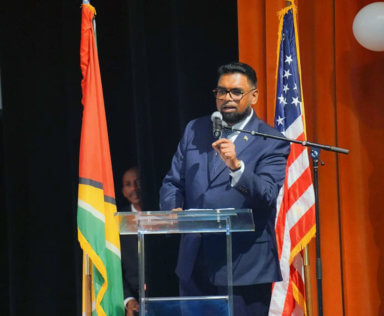‘BLACK GOLD’ DISPUTE

As is the case whenever there is a major development in Guyana’s oil and gas sector, neighboring Venezuela, which has long claimed a large part of its neighbor’s land and marine space as its own files objections, reminding anyone who would listen that its neighbor to the east has no right to proceed with the project.
So, few would have been surprised this week when Venezuelan authorities formally chided Guyana for opening bids for 14 additional offshore oil blocks saying the country did so illegally and without reference to Venezuela’s belief that it owns the offshore area that Guyana will eventually award to some of the world’s super major oil firms.
“The Bolivarian Republic of Venezuela reiterates that any illicit and arbitrary concession that Guyana grants, has granted or intends to grant in the areas in question is unacceptable and violates its sovereign rights, and warns that these actions do not generate any type of rights for third parties to participate in this process,” its foreign ministry said in a statement.
The reaction from Georgetown was unsurprisingly swift with President Irfaan Ali in New York for the annual United Nations General Assembly, saying that Guyana will proceed with its development agenda regardless of Venezuelan objections.
“The government of Guyana reserves the right to pursue economic development activities in any portion of its sovereign territory or any appurtenant maritime territories. Any unilateral attempt by Venezuela to restrict the exercise by Guyana of its sovereignty and sovereign rights will be wholly inconsistent with the Geneva Agreement and the rule of international law.”
It said that the Venezuelan missive had concluded by saying that the country could “apply all the necessary measures” to prevent the awards of blocks to companies licensed by Guyana. This the country considers “to be a threat not only to Guyana but to regional and international peace and security, as well as to all of Guyana’s current and potential investment partners.”
Venezuela has since for more than 50 years been laying claim to the western Essequibo Region in Guyana and waters related to the county which accounts for two thirds of the land mass.
Back in 2015 when Exxonmobil and consortium partners declared a world class offshore oil and gas find, Venezuela issued a decree redrawing land and marine maps encompassing the entire Guyana and neighboring Caribbean countries as it had ordered the companies not to proceed with the development of the oilfields. This was promptly ignored.
Daily production is today hovering around 400,000 barrels per day and could climb to a million in about two years’ time when additional production fields come on stream.
Maintaining its objections to the bid round, Caracas made it clear that Guyana “does not have sovereign rights over these maritime areas and consequently any action within their limits is in violation of international law as long as they are not carried out through an agreement with Venezuela.”
In the meantime, the two sides are awaiting a ruling from the World Court as to exactly where land and marine borders are. Guyana is the one which has taken the case to the court in The Netherlands and maintains that Venezuela is the one with a demarcation line problem.





